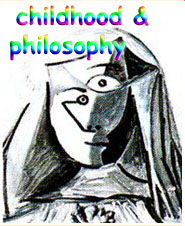perspectivas de docentes y alumnos sobre la discusión filosófica: la incertidumbre como un desafío y una oportunidad
DOI:
https://doi.org/10.12957/childphilo.2019.42675Palabras clave:
incertidumbre, teoría de la educación, filosofarResumen
Investigamos las experiencias de maestros en filosofía con niñas y niños a través del análisis de contenido de entrevistas con maestros de la educación infantil y de discusiones con grupos de alumnos de este mismo nivel de enseñanza. Los resultados muestran que sesiones regulares de filosofía con niñas y niños pueden tener un impacto en la visión de los maestras de sí propias como educadores, su abordaje de la enseñanza y su desarrollo personal. Desde el punto de vista de niñas y niños, el aspecto más importante y significativo, aparte del contenido de la discusión filosófica, fue la oportunidad de pensar juntos de manera abierta. Un componente clave de la construcción colectiva del significado fue la incertidumbre, que es una característica integral de la discusión filosófica. Estos hallazgos se relacionan con la idea de "ciudadano como agente" de varias maneras. Filosofar con niñas y niños conduce a un estilo de enseñanza más colaborativo y democrático, dando a niñas y niños espacio para llevar sus propios intereses y actividades a la discusión. Esto se alinea con el disfrute que sienten por la apertura y la incertidumbre de los problemas filosóficos, su apreciación de la oportunidad de participar con diferentes ideas y puntos de vista, y su disposición a afrontar el desafío de revisar sus propias posiciones y cambiar su forma de pensar.Descargas
Citas
Barrow, W. (2015). „I think she’s learnt how to sort of let the class peak“. An exploratory study of children’s perspectives on P4C as participatory pedagogy. In Thinking skills and creativity, 17, p. 76-87.
Fair, F., et al. (2015). Socrates in the Schools from Scotland to Texas. Replication a study on the effects of a Philosophy for Children program. In Journal of Philosophy in Schools, 2/1, p. 18-37.
Flick, Uwe (2016). Qualitative Sozialforschung. Eine Einführung. 7th Edition. Reinbek bei Hamburg.
Gaparatou, R. & Erganzaki, M. (2015). Stundents’ Views about Their Participation in a Philosophy Program. In Creative Education, 6, p. 726-737.
Gorard, S., Siddiqui, N., & See, B. H. (2015). Philosophy for Children. Evaluation Report and Executive Summary. School of Education. Durham University.
Haller, T. (2015). Philosophieren mit Kindern im Fachunterricht. Eine empirische Untersuchung zu Erfahrungen und Einstellungen von Lehrerinnen und Lehrern. Masterarbeit im Studiengang Lehramt Primar- und Sekundarstufe. Universität Hamburg.
Helsper, W. (1996). Antinomien des Lehrerhandelns in modernisierten pädagogischen Kulturen. Paradoxe Verwendungsweisen von Autonomie und Selbstverantwortlichkeit. In A. Combe, W. Helsper (Ed.). Pädagogische Professionalität. Untersuchungen zum Typus pädagogischen Handelns, p. 521-569.
Helsper, W. (2001). Antinomien des Lehrerhandelns – Anfragen an die Bildungsgangdidaktik. In U. Hericks/J. Keuffer/H.-Ch. Kräft/I. Kunze (Ed.). Bildungsgangdidaktik. Perspektiven für Fachunterricht und Lehrerbildung. Opladen.
Helzel, G. (2018). Kindliche Entwicklungsprozesse beim Philosophieren. Eine empirische Studie zu Ungewissheit und Mehrperspektivität. Opladen, Berlin, Toronto.
Helzel, G./Michalik, K. (2015). Kindliche Entwicklungsprozesse beim Philosophieren mit Kindern. Eine empirische Untersuchung zu Mehr-Perspektivität und Ungewissheitstoleranz. In: H.-J. Fischer/H. Giest/K. Michalik (Ed.): Bildung im und durch Sachunterricht. Bad Heilbrunn, p. 189-196.
Jenkins, J. (1986). Philosophy for Children Programme at a Gloucestershire Cemprehensive School in Great Britain. In Thinking. The Journal of Philosphy for Children, 6, 3, p.33-37.
Jeschke, S. (Ed.) (2013). Exploring Uncertainty. Ungewissheit und Unsicherheit im interdisziplinären Diskurs. Wiesbaden.
Koller, H.C. (2012): Bildung anders denken. Einführung in die Theorie transformatorischer Bildungsprozesse. Stuttgart.
Mayring, P. (2015). Qualitative Inhaltsanalyse. Grundlagen und Techniken. 12., revised edition. Weinheim und Basel. Beltz.
Michalik, K. (2012). Interviews mit Lehrkräften und Gruppendiskussionen mit Kindern zu Wahrnehmungen und Bewertungen des Philosophierens mit Kindern. Forschungsprojekt an der Fakultät für Erziehungswissenschaft der Universität Hamburg.
Michalik, Kerstin (2015): Philosophische Gespräche mit Kindern als Medium für Bildungsprozesse im Sachunterricht. In Bildung im und durch Sachunterricht. In H.-J. Fischer/H. Giest/K. Michalik. Bad Heilbrunn. p. 175 – 182.
Michalik, K. (2018). Empirische Forschung zu Wirkungen philosophischer Gespräche mit Kindern. In. H. de Boer, K. Michalik (Ed.). Philosophieren mit Kindern - Forschungszugänge und -perspektiven. Opladen, Berlin, Toronto, p. 13-32.
Pálsson, H. (1996). We Think More than Before about Others and their Opinions. An Evaluation Report from Iceland. In. Thinking and Reasoning 12, p. 24-28.
Pfeiffer, S. (2013). Das Unterrichtsfach Philosophieren mit Kinder in MecklenburgVorpommern. In Pädagogische Rundschau 67, 6, p. 651-669.
Scholl, R. (2014). „Inside-out Pedagogy“. Theorising Pedagogical Transformation through Teaching Philosophy. In Australian Journal of Teaching Philosophy, 39/6), p. 89-106.
Siddiqui, N., Gorard, S., See, B. H. (2017). Non-cognitive impacts of Philosophy for Children. School of Education Durham University.
Scholl, R./Nichols, Kim/Burgh, Gilbert (2014). Transforming pedagogy through philosophical inquiry. In. International Journal of Pedagogies and Learning, 9/3, p. 253-272.
Scholl, Rosie/Nichols, K./Burgh, G. (2016). Connecting learning to the world beyond the classroom through collaborative philosophical inquiry. In. Asia-Pacific Journal of Teacher Education, 44/5, p. 436-454.
Topping, Keith J./Trickey, Steve (2007). Collaborative Philosophical Enquiry for School children. Participant Evaluation at 11 Years, in. Thinking. The Journal of Philosophy for Children 18/3, p. 23-34.
Descargas
Publicado
Cómo citar
Número
Sección
Licencia
el copyright de cada artículo pertenece a cada autor. childhood & philosophy tiene el derecho a la primera publicación. el permiso de reimprimir cualquier artículo que haya aparecido en la revista necesita de la autorización escrita del autor. en adisión a cualquier forma de reconocimiento requerido por el autor el siguiente aviso debe ser añadido a la declaración de permiso en la reimpresión (con los números apropiados a los puntos suspensivos): [título del artículo] fue publicado originalmente en la infancia y la filosofía, tomo ..., número ..., pp. ...-...




